“The Lord hates a coward”
– Somewhere in the bible.
I was made redundant last week. A money man from London rocked up at the school, made a speech about wanting to secure education in the town for the next one hundred years, then sacked thirty-odd people (a third of the staff team) before whizzing back up to the city on the fast train, to resume whatever life he lives up there. On the Monday of his visitation, I was asked to compete for my job against two other teachers. Winner takes all.
Well, you get to keep the job you already have. But you lose much more than that.
It took me a couple of days to get over the initial shock. I have two good locals that help with things like this. And I’ve managed to tame the subsequent anger- which at one point was crippling- by getting out into Kent’s backyard. One thing that’s helped is that I don’t panic when facing uncertainty. Instead, I just resolutely ignore it and do more of the things I like. I eat more, read more, cook more, pub more, lift more weights and do more fishing.
The Wednesday after the announcement, I got up early and packed my car with fishing rods, binoculars and other country-related paraphernalia. In case you’re wondering, I wasn’t skiving; I don’t work Wednesdays, and haven’t done for nearly two years. So whilst most of the population is muddling through the mid-week blues, I’ve been fishing, walking, rabbiting, birding. Also idling, I suppose. But learning, too- and developing a much better knowledge of my small part of the world.
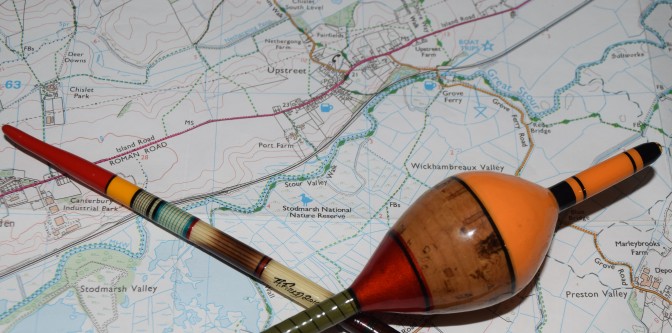
I set off intent on fishing the floodplains of the Kentish Stour below Canterbury- along whose lowlands I can drift for miles, angling and nature watching. It helps that these stretches are currently less attended than at any time since the 1980’s, back when coach loads full of anglers used to come and fish great roach matches here. In those days, they lined the banks from one village to another but now you can wander the low country for hours on end without seeing anybody.
On this Wednesday I visited the Wickhambreaux valley, a few miles east of Canterbury. I entered by descending a hill that winds down from the highest point of the Sturry-bound road, just north of the Stodmarsh National Nature Reserve. This part of the valley is a favourite with many Stour-walkers. It holds an abundance of birdlife; on my way down to the water, I saw great tits, blue tits and slowed the car down to watch a cock chaffinch bouncing around in a hawthorn bush near the railway tracks.
I wouldn’t be doing much walking today. I’d been dreaming for some weeks of a dyke that runs off the main river. As it rains, the small channel fills up and at this time of the year, various fish swim in for shelter from the main flow. The water there is clearer and there is no current.
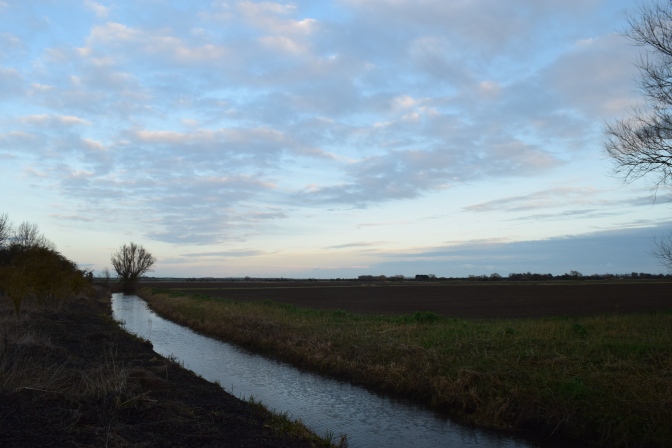
I got to the drain just after dawn. I dumped my stuff and wandered for a bit. The valley is a desolate beauty in January. In fact it’s painfully exposed. In the thin, midwinter air, you can see for miles across the plains. Crow-calls come and go like ghosts in the morning mist. Occasionally, you get near to an older one that’s too tired to run. Or else wise enough to know that men who bring rods are harmless.
Especially one with an old bit of cane. I’d bought old fashioned tackle today. A 60 year old bamboo rod, a bobber float etc. I fish very, very simply. I don’t really take much bait with me other than a pot of worms, and maybe a pint of maggots. I stay mobile, carrying all my bits and pieces in an old canvas rucksack. I also take a folding stool, which can fit into my landing net as I walk. This in turn gets draped over one shoulder as I follow the river.
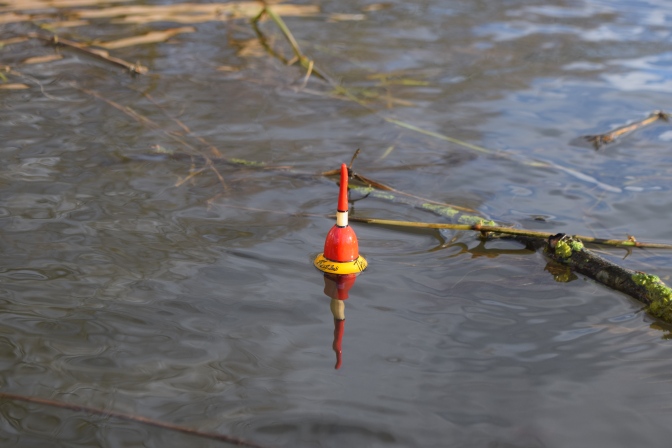
I fished from one end of the drain to another, dropping a worm into any likely looking holes. Undercut banks are my favourite, where the fish hide and wait for passing food. I don’t cast out really, just lower the bait down into the depths. At this time of the year, it’s a bit like playing ‘Knock-Knock’. The fish are almost dormant. They will still eat, but they won’t move around too much. You have to land the bait right on their nose. On my third cast, I caught a perch.
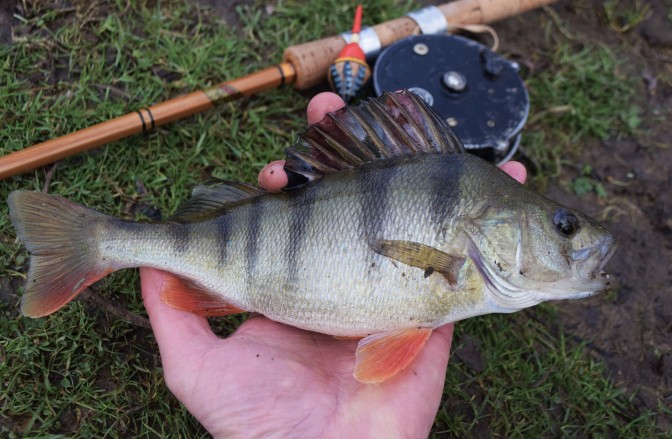
I handled him carefully, but admired him for a short while before slipping him back. After this, I went for several hours without a bite. I must have tried two dozen different spots without a reply.
Levity came in the form of a robin, who found me shortly after I caught the perch and then stayed with me until noon. I threw him the odd maggot and in return he lit the river up for me. Robins and perch are cardinal creatures. Flame breasted and fiery finned, they’re the flickering beacons that help a winter coarse fisher navigate the shadows of the river valley.
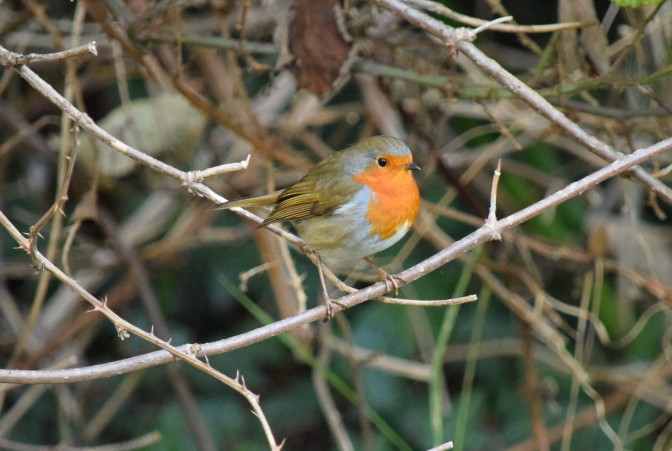
And there can be many shadows. By one ‘o’ clock, the early ground mist had turned into a dense carpet of fog. The plains were closing in on me; my immediate surroundings became more intimate. The robin departed and the earlier, distant crow-cries began to grow nearer, as they always do in times of low visibility. By two in the afternoon, I reached the end of the drain.
This part of the river is marked out by an old wooden bridge which is propped up by a ancient, greening weed-rack. It’s what separates the dyke from the main stream. I winched my float down slowly into the area adjacent to the rack, where there is a decent depth in times of flood, and began to bounce the worm around the bottom. After half an hour or so, I received a slow but deliberate bite. The bobber didn’t jerk around, as it does with a perch, but rather was pulled slowly under twice. There was a brief pause, and when it went under again, it kept going. I watched the red tip of the float travel downwards for several feet back towards the bridge, until I could no longer see it. Then I struck.
My rod bent into something heavy. I tried a little side-strain but nothing happened. I thought I must have hooked a large pike; they rarely travel into the drain, but I started to imagine that I’d disturbed one that swam in as an infant and had become too fat to exit via the gaps in the weed-rack. All of a sudden, the weight began to move. Ponderously at first, into the open water. My float surfaced as the fish entered a shallow area and I caught a brief glimpse of a large shadow beneath it. Upon seeing it, I drew breath slightly and struck upwards.
I had made a mistake.
The fish panicked and immediately went deeper. A foot. Two foot. Then it paused. I held my breath and after about three seconds, it made a terrifying dash for the submerged weed-rack. Whatever this fish was, I was ill-equipped for it. I was using 4lb breaking strain line and a rod designed for boy-anglers in the 1950’s. The rod bent double and then creaked as the fish smashed head first into the rack. A resident duck on the other side of the bridge reacted as though a shotgun had gone off and flew up over the central course of the river. This in turn disturbed a nearby crow who, instead of fleeing, began to bounce around on the farmland opposite me as though dancing to a distant drum roll that I could not hear.
I angled my rod low, submerging it into the water to get a softer angle. Time passed, the fish would not move, and the cane took on the shape of a horse-shoe. I’m not exaggerating. The rod tip was not far from touching the butt section at one point, which probably did the old rod no good at all, but it never felt like breaking. I’d always thought that a bamboo rod would snap sooner than a modern carbon one, but it just kept on bending- well past its healthy limits. But as much as anglers love acquiring such beautiful old tackle, we’re all capable of sacrificing it in the heat of battle. No other field sport in the world connects you to your quarry in the way that fishing does; once an angler has hooked a fish, his whole world hinges upon bringing it to the bank.
The fish stayed down near the rack for well over three minutes, which is a lifetime for a river angler. I began to see that the elasticity of the rod was cushioning the strain on the line to within its breaking limits, so I began a series of gentle plucks and pulls. After a while, this coaxed the fish back into the open channel- well away from the snags, which I’d avoided through luck, not skill. It was moving considerably more slowly by now. I felt a lot calmer; it gradually dawned on me that I could still hear the crow, even though he’d left at some point earlier.
The fish began to swim in an ever decreasing circle. And a shallower one, too. When I saw a distinctly golden flank, I couldn’t believe it. It was a big river carp. I’d only ever caught one before from running water. Not far from here- a few seasons back; a baby, really. But this was the real article. Not long afterwards, the fish began to surface and I broke into a wide grin as I landed what must be one of the best looking fish in the whole valley. An immaculately proportioned common carp with huge, perfectly formed scales, dripped all over in a stunning golden-bronze. It easily nudged my ‘perch’ scales up over their twelve pound limit, so I can’t be entirely sure what he weighed, but he would have comfortably made mid-double figures, perhaps slightly more. He felt immensely dense and heavy, even for his frame; a real river monster.
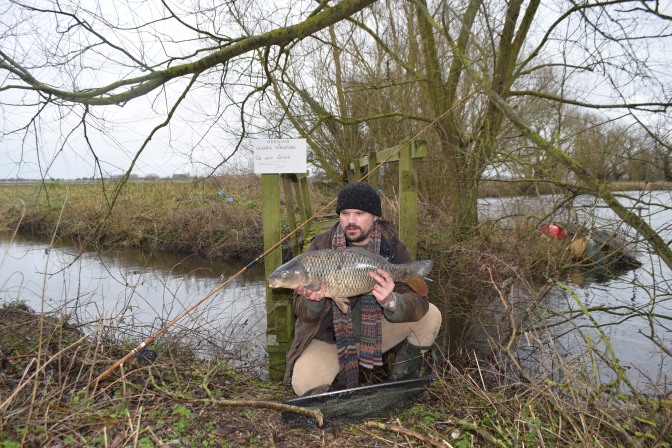
I released the fish and watched him go back into the flood. The valley would be a little less bright without him, but she’d given me a great gift- and one that I shall remember for a long time. As I departed, the levels began to recede again, but the fog would be back later. This was the last of the recent days when the river was fishable. Well, with a reasonable chance, anyway. That night, the rain came back and the thermometer has stayed below the critical ‘five’ degrees ever since. Soon it will be spring and time for trout. I’ve just signed up for fly-tying classes. I’d like to catch a fish on my own fly before I’m forty, which is in May.
After that, who knows what will happen? I refuse to go up against my fellow teachers in the reapplication process, which means I’ve pretty much rendered myself redundant. I’ve been lucky in teaching. I’ve only had to make a couple of difficult decisions and thus far I’ve based them on honour, rather than money, so I’m going to keep that going for a little while longer. I don’t want to get corrupted just yet. I’ll save that for the other side of forty.
That old river bridge has been falling down for some time. In fact, the farmer has placed a note on it that warns ramblers not to cross it. It’s obsolete. Soon it’ll be torn down and replaced by something newer.
The other side of the bridge leads to more crows and eventually on to ‘Blood Point’, a great bend in the river where King Alfred killed many Vikings a thousand or so years ago.
I like to walk there sometimes, but it’s without question the darker side of the valley.
Maybe some bridges aren’t meant to be fixed.
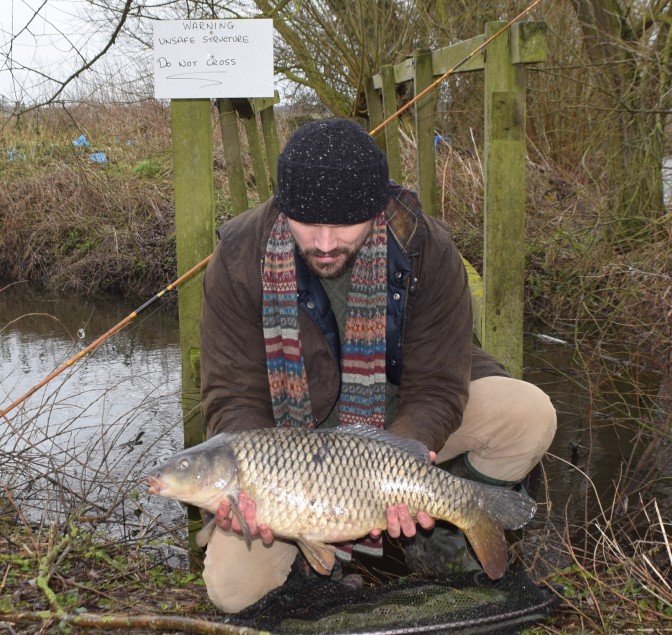
thanks for the fine little read,a true countryman,its amazing what you soak up when your out on your own and being able to put it down on paper is pure skill,i just have memories much the same as yours i just wish i was 40 once more .
LikeLiked by 1 person
What a lovely comment- thanks very much indeed Geoff- Here’s to making a few more memories, mate- Best Regards, Gareth
LikeLike
as you will have said many times,must try harder.
LikeLiked by 1 person
Faced all that 2 years ago, been on borrowed time since then. Think I’ve another decision to make soon. I’ll have a choice to make on my own terms this time. Hope life treats you well.
LikeLiked by 1 person
Hello Stephen- Kind words, mate! Thank you. I’ll be fine- it’s just not pleasant to watch others going through it, some of whom are perhaps a little more vulnerable. It’s been a lovely post and it’s a shame to end it like this, but you have to roll with the blows; it’s sad but not a tragedy, I live to teach another day! Sorry to hear that you’ve been through (and are going through) a similar situation, mate- I wish you all the very best in coming through it, mucka- Best Regards, Gazza
LikeLike
Fine writing as usual from you Garret, sorry to hear about the redundancy been there a few times myself you’re a gifted young man and I am sure you will weather the storm and come out stronger the other end, good luck!
LikeLiked by 1 person
Thanks Roger- Immensely kind words, mate- I won’t let it get me down- Onwards and upwards! Gazza
LikeLike
Don’t let the b******s grind you down !
LikeLiked by 1 person
Good stuff! Cheers, Beltaine- I like the sentiment!- Gazza
LikeLike
Thoughtful, brave words, as ever. Best of luck with it all, Gareth, I’m sure you’ll be fine. Super carp too! Ben.
LikeLiked by 1 person
Cheers, Ben- I always get work but if I don’t then it’s rod and rifle country! Rabbits for supper and trout for breakfast…
LikeLike
Enjoyed your blog very much,I was the chap you spoke to outside your home the other morning the one who’s of to fish the Broads ,I do think a book is in the making keep it up great read.
LikeLiked by 1 person
Hello Albert- Thanks for such lovely feedback- I’d like to write a book about perch fishing old Mill Pools up and down the country- many hold huge stripeys and all of them have lovely, historic pubs nearby! Good Luck on the Broads, this year- I’d love to fish them- One winter I’ll be there with a pike rod…
LikeLike
Thanks Gareth ,I reconise the area where you are holding the carp (which is one species I have not been able to catch from the river yet ) I have crossed that bridge many an early winter morning to get a swim opposite the boat house before the rush. Tight Lines
LikeLiked by 1 person
That’s my favourite time of the year, Albert! I think for most coarse fisherman, especially the river folk- the winter is like heaven, isn’t it? And the swims you refer to are lovely, aren’t they? Very underrated for perch fishing- I’ve caught them to over two pounds there for the past two seasons running- lovely, bold coloured creatures… Tight Lines to you, too, mate- Gazza
LikeLike
A great read as all ways Gazza that bridge is still there well most of it any way (just make sure your life insurance is up to be date for you next go across)
as Albert said you should write a book I would buy it and it might even get Chris off his bloody phone for a few days.
looking forward to you next one all the very best Trev
PS take care on the bridges
LikeLiked by 1 person
Good man! Thanks, Trev- I’ve always thought a good idea for a book would be travelling up and down England perch fishing the Mill Pools? They’ve got the history, the pubs and of course… Big Perch! Thanks again for reading and taking the time to comment- it’s hugely appreciated- Good Luck with the upcoming Cold Season! Best Regards, Gazza
LikeLike
Gareth, The day’s blog ration has been read. I went through a bit of that in the University with staff in my department. A man with no knowledge ‘let’s them go’, but they wouldn’t let me speak to them. I told the boss it was a man who was good with numbers but no talent firing people with talent. The reply was he hasn’t fired them ‘we’ve let them go’. Makes my blood boil, hypocrites.
Anyway a lovely post and a great reference for the soothing qualities of a beer.
Once the family have gone back south I’m out after perch, about which we must talk more.
All the best, regards, John
LikeLiked by 1 person
Hello John- Yes, Thank God for ale and fishing! A couple of strategically positioned locals and some new floats got me through that whole period. And of course, a carp like that one helped! The unexpected fish. Good to see you getting through the yarns. How’s that ration book looking?! Look forward to talking perch… Without question my favourite quarry… Best Regards, Gazza
LikeLike